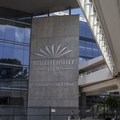Naspers was taking measures to reduce its stock's significant discount to fair value, largely the result of capital outflows from SA, CEO Bob van Dijk told investors in New York on Tuesday.
The internet holding company's discount to the value of its underlying portfolio was about 38%, versus a fair discount of about 20%, Van Dijk said.
"Our discount was 20%-25% for a long time, but that started changing about 20 months ago," he said.
This was primarily the result of capital outflows from SA due to "political turmoil" and other risks associated with investing in the country.
Since Naspers accounted for about a fifth of the JSE all share index, "we take a disproportionate share" of outflows.
It was also partly a function of the group's still unprofitable e-commerce business, which continues to suck up cash as it builds scale.
To reduce the discount, Van Dijk said getting Naspers's e-commerce business to profitability was a "top priority", while the group would also improve transparency and ensure that it engaged proactively with stakeholders so that they could better understand its business activities.
If these initiatives failed, Naspers would consider "structural options".
Asked whether Naspers would move its primary listing out of SA, Van Dijk said "to change it would be very difficult, to the point of impossible".
This was despite the fact that more than 80% of the company's business was now outside of SA and this number was going up "quite rapidly".
Van Dijk said Naspers's opaque control structure, whereby it has two classes of shares, was very seldom flagged as a concern by shareholders.
It also ensured that the company would not be subject to a hostile takeover, which was important to regulators in countries such as China.
Meanwhile, Van Dijk said Naspers would generate 100% of its revenues from the internet in the relatively near future, from 77% of turnover at present and 34% in 2012.
The group was asking its pay-TV business and print media operations "not to lose relevance to customers", he said, adding that all news and video entertainment would be consumed online soon.
Van Dijk said Naspers had probably missed the boat in the ride-sharing space, which is now dominated by the likes of Uber and Lyft.
"We probably missed a few investment opportunities that we didn't see the potential in.
"We decided at some stage that we didn't want to invest there" I think by now it is too late to make a proper return on it," he said.
One of the major considerations it had taken into account was "how defensible is a leadership position in ride sharing?" and the ability to sustain margins in the industry.
Bloomberg reported in November that Uber's net loss widened to $1.46bn in the third quarter as the company struggled to fend off competition, legal challenges and regulatory scrutiny.
Naspers said in November that its e-commerce unit, which includes classifieds, online retail payments and food delivery services, grew revenue by 15% to $1.6bn in the six months to September. On a like-for-like basis, revenue was up 38%.
While e-commerce trading losses rose 9% to $318m, the classifieds unit edged towards profitability and Naspers said its main payments business, PayU, "is well on track to achieve break-even by the end of the financial year".





















































